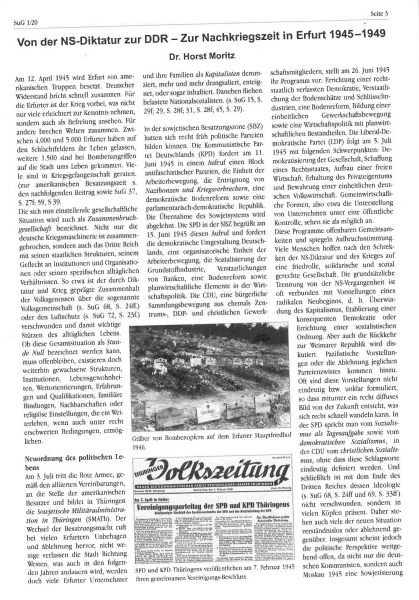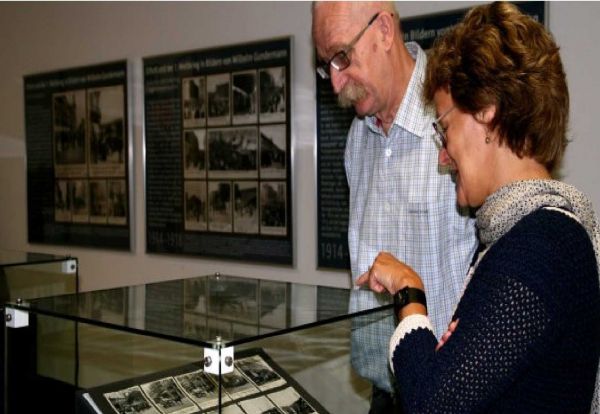Revolution, part II, Changing the Ground-rules
The above magazine article appeared in January 2020 issue of the Stadt und Geschichte, the monthly magazine of the City Archive (Stadtarchiv) of Erfurt, Germany. written by Dr. Horst Moritz, a senior historian at the Archiv. As the official repository for government documents and correspondence, the archivists can speak with authority about historical events in Erfurt, and inferentially about most of the rest of Germany.
Stadtarchiv Director Dr. Antje Bauer confers with Dr. Horst Moritz
The article starts with the peaceful capitulation of Erfurt in April, 1945, the arrival of the American Army, and the surrender of all German forces on May 8th. For some people in Erfurt, the news meant the end of the World. Between four and five thousand young men from the city had died in battle. A further fifteen hundred had died during bombardments of the city. Defeat delivered into internment or incarceration the surviving soldiers. Not only had the Army surrendered and the Nazis abdicated, but the daily life of Erfurters lost orientation and a value system.
But Moritz contends that the end of the Nazi government did not necessarily represent a "Stunde Null," ground-zero in an area of total devastation. Most Erfurters, in fact, felt a liberating relief that the now-pointless War had finally ended. And after all, the city had surrendered to the Americans, whom they trusted, and not to the Soviets, whom they feared, with some justification.
The American Army ordered Erfurters to surrender all weapons, radio equipment, and--get this!--messenger pigeons.They also had to register with the Army to ascertain their identities and check for outstanding warrants. The Army handed out packets of seeds so that Erfurters could cultivate a garden. If they shoveled rubble and debris to the street-curb, Army trucks would pick it up and haul it away. But the Army also warned them not to shovel debris into shell-holes, since the holes might still contain live ordinance. Bomb-disposal units would have to check each hole.
As the Army reconstructed street-car lines, repaired power-lines, and restored public utilities, life in Erfurt recovered a level of normalcy. Religious, familial, and neighborhood units reconnected to assure Erfurters of a "Weiterleben," a continuing communal life. (After the Russians depart Ukraine, the Allies will have to repeat this process to bring Ukraine back from its "Stunde Null.")
The American Army remained in Erfurt from April until July of 1945, then turned the administration of the city over to the Soviet Army. Immediately things began to change. Some Erfurters, writes Moritz, got wind of the reorganization of Germany into "Zones" administered by the Allies and the Soviets--with Erfurt trapped in the Soviet Zone--and departed with the Americans.
As the Soviets' intentions toward East Germany materialized, more and more Erfurters fled to the West. The Soviets instituted a Soviet-Marxist model of governing, with complete control of the media, coerced confiscation of businesses and banks, and stigmatized business-owners and bankers as "Nazi-collaborators," more or less as the Nazis had stimatized Jewish business-owners and bankers as "Zionist-collaborators."
Erfurt's political parties resembled their Western counterparts--like the CDU, Christian Democrats, and the SPD, the Social Democrats--in name only. Party platforms typically toed the Soviet line, with few exceptions. Dr. Moritz refers to them as the "der Block der antifaschistisch-demokratischen Parteien." The only notable exception, Moritz writes, the LPD, the Liberal Democrats, took a chance and offered Erfurters a Western-oriented platform: preserving a market economy, and making private business and industry the status quo, subordination of the society to constitutional law, and the retention of private control of media-organs.
In a sort of trial-election, Erfurters voted for the political party to represent them in the government. Notwithstanding the Soviet impress of the society, 41% of Erfurters voted for the LPD, followed by the watered-down CDU with 24%. The Soviet-supported SED, or Socialist Unity Party, had to settle for third place. The courage and impudence of the LDP rebels and their supporters outraged the Soviets. They jailed the LPD leadership and even executed one obstinate party-officer.
I have concluded that the Erfurters had not simply had enough of dictatorship. They had also had enough of the regimentation and impress of socialism. Enough of dictated equality, a government-centered economy, and loss of private spaces.


